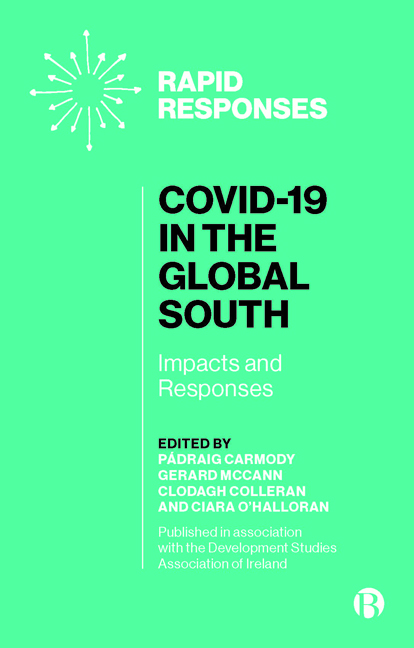17 - After the Immediate Coronavirus Crisis: Three Scenarios for Global Development
Published online by Cambridge University Press: 23 March 2021
Summary
COVID-19 is transforming national policies on an unimaginable scale: ‘austerity’ has vanished and (hyper)Keynesian spending is back; neoliberal regimes are making unimaginable welfare interventions; income support is favoured in some countries; and hyper-globalization policies are being reined in. Seemingly everything has changed. The initial pressures for these transformations focused on proximate problems: rapid responses to risks of premature death from a new disease and temporary support for employment, incomes, household food security and the economy. But, at a structural level, the coronavirus pandemic could help transform the institutions and norms that have underpinned global development in the early 21st century, for better or worse.
This may be a critical juncture (Green, 2020), where actions taken now could have legacies for decades to come. The pandemic could be a time for what Naomi Klein (2007) has called ‘shock doctrine’, where it is exploited for questionable purposes to create an unappealing future, or it could set the course for a better future. In this chapter, we explore three scenarios of ‘what’ the future might be like, rather than predictions, as an aid for those thinking about how to shape global futures.
Scenario 1. Ugly: global meltdown
The proximate impacts of the coronavirus pandemic have been extremely negative: public fear, increased mortality, loss of jobs and reduced or cessation (for example, especially for informal-sector households) of income, collapsed businesses, strained public health services, a massive rise in public debt, loss of personal mobility and threats of social and political breakdown. These negative impacts create processes that could greatly increase the likelihood of structural changes that undermine the prospects for human development. At the extreme, they include apocalypse.
Potentially, such a scenario could develop from either the direct health threat of the coronavirus or the indirect impacts of the disease on economic, social and political life. COVID-19 has increased mortality rates for some groups in some parts of the world (Our World in Data, 2020). Potential struggles in developing and making available a vaccine, difficulties of eradicating and potential mutations of the virus can increase such impacts. Yet, the new disease's influence on overall mortality rates seems unlikely to approach those of the two world wars or the ‘Spanish flu’ (at least 50 million deaths).
- Type
- Chapter
- Information
- COVID-19 in the Global SouthImpacts and Responses, pp. 183 - 192Publisher: Bristol University PressPrint publication year: 2020
- 2
- Cited by



